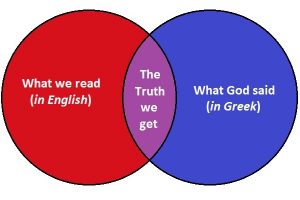 I put love in quotes because our English word “love” has a lot of linguistic baggage. It has so many meanings it’s almost meaningless these days.
I put love in quotes because our English word “love” has a lot of linguistic baggage. It has so many meanings it’s almost meaningless these days.
Not so with the Greek word(s).
Like a lot of Greek words, it has a specific and technical meaning that is often completely lost on English readers. In my humble opinion, The Greatest Commandment is the second worst case of mistranslation in the entire Bible.
The Greatest Commandment
Matthew 22:34-40
34 But when the Pharisees heard that he had silenced the Sadducees, they gathered together.
35 And one of them, a lawyer, asked him a question to test him.
36 “Teacher, which is the great commandment in the Law?”
37 And he said to him, “You shall love the Lord your God with all your heart and with all your soul and with all your mind.
38 This is the great and first commandment.
39 And a second is like it: You shall love your neighbor as yourself.
40 On these two commandments depend all the Law and the Prophets.”
Now that we know what we’re talking about, let’s break down the words.
Our English Word “love”
According to Merriam-Webster’s dictionary, love means:
- strong affection for another arising out of kinship or personal ties
- attraction based on sexual desire : affection and tenderness felt by lovers
- affection based on admiration, benevolence, or common interests
- unselfish loyal and benevolent concern for the good of another
I would like to point out that in English, the word “love” is primarily concerned with feelings of attraction or affection. Our word Love is nearly always a noun (person, place, thing, or feeling) and rarely a verb (action). It can be a verb, but typical usage is primarily feelings based.
That would make The Greatest Commandment primarily based on how we feel about God, not what we do. That stands in complete opposition to the Greek word in this passage.
The four Greek words for “Love”
Again, I put ‘love’ in quotes because the Greek words for love don’t necessarily have the same meaning as our English word.
“στοργέ” (storgé). It’s used twice in the New Testament with a negative prefix (like amoral, meaning not moral). The version with the negative prefix is “ἄστοργος” (astorgos) means “without natural affection”, referring primarily to family. i.e. “not loving their family”.
“ἔρως” (eros). Eros is the root of our word “erotic” and it refers specifically to sexual love. It does not occur in the Bible. (it also doesn’t refer to “romantic love”; only sexual love)
“φιλέω” (phileó). is the closest to our English word love, but doesn’t have a romantic connotation. It’s used of friends and means “to show warm affection in intimate friendship, characterized by tender, heartfelt consideration and kinship.” It can also be used of things as in Matthew 6:5, where the hypocrites “love” (phileó) to be seen praying.Notice that phileó is very close to our English word “love”; only it lacks the romantic component. (Suggesting a close friendship instead of romantic attraction)
“ἀγάπη” (agapé). This is the word Jesus uses in The Greatest Commandment, only He uses the verb form “ἀγαπάω” (agapaó).
As usual, Strong’s Concordance gets the definition of agapé completely wrong. The ever popular BlueLetterBible.org is based around Strong’s Concordance, and so gets it equally wrong too… as usual (though at least they also have Thayer’s Greek Lexicon at the bottom of the page)
But here is what Strong’s says: (just realize it’s wrong)
- of persons
- to welcome, to entertain, to be fond of, to love dearly
- of things
- to be well pleased, to be contented at or with a thing
The Strong’s definition of agapé leaves you with the same definition as phileó or our English word love. i.e. it’s primarily about feelings. However, that is not what Jesus said. Feelings are nouns. However agapé isn’t a noun in the Greatest Commandment; it’s a verb.
Further, agapé doesn’t even refer to feelings in the noun form.
Most people will tell you agapé refers to “sacrificial love”, with the idea that you love “have such strong affection/phileó for” someone that you’d die for them. A quick Google search will confirm this is the commonly held view. However, no one quotes an actual Greek lexicon when they define agapé.
I will.
The Greek Word Agapé (translated love in The Greatest Commandment)
In Homer’s epic story The Odyssey, our hero returns home after 20 years to find his house filled with ruffians. He disguises himself to infiltrate, then kicks them all out. He convinces his wife that it’s him, and she says this:
Homer’s The Odyssey Book XXIII, lines 213-215.
Don’t be angry, or upset, because I didn’t give you this welcome (agapé) the moment I saw you.
Hmm, doesn’t sound like “love” does it? I quoted this bit of Ancient Greek literature to show the actual Greek usage of agapé isn’t what you’ve been taught in church or seen translated in your Bible.
Note: Greek words have different forms depending on their function. Specifically, agapé has two forms that are relevant here:
- agapé – is the noun form
- agapáō – is the verb form
With that in mind, let’s look at the definition in the noun form.
26 agápē – properly, love which centers in moral preference. So too in secular ancient Greek, 26 (agápē) focuses on preference; likewise the verb form (25 /agapáō) in antiquity meant “to prefer” (TDNT, 7). In the NT, 26 (agápē) typically refers to divine love (= what God prefers).
Now let’s look at the verb form, which is used in The Greatest Commandment.
25 agapáō – properly, to prefer, to love; for the believer, preferring to “live through Christ” (1 Jn 4:9,10), i.e. embracing God’s will (choosing His choices) and obeying them through His power. 25 (agapáō) preeminently refers to what God prefers as He “is love” (1 Jn 4:8,16). See 26 (agapē).
With the believer, 25 /agapáō (“to love”) means actively doing what the Lord prefers, with Him (by His power and direction). True 25 /agapáō (“loving”) is always defined by God – a “discriminating affection which involves choice and selection” (WS, 477). 1 Jn 4:8,16,17 for example convey how loving (“preferring,” 25 /agapáō) is Christ living His life through the believer.
In The Odyssey quote above, the wife was apologizing for not “showing preference” to her husband the moment she saw him. (because he was disguised and thus she didn’t recognize him) Her feelings for her husband never changed; she was apologizing for her actions.
I’ll re-quote the most relevant part of the definition:
Agapáō means actively doing what the Lord prefers
It’s not about feelings.
It never has been.
It’s about actions; it’s about choice. God wants us to actively choose Him over everything else. It’s The Greatest Commandment.
Matthew 22:37-38
37 And he said to him, “You shall
loveshow preference for the Lord your God with all your heart and with all your soul and with all your mind.38 This is the great and first commandment.
The Greatest Commandment is to actively show preference for what God wants instead of what you (or anyone else) wants… and to do this with everything you have and everything you are.
This commandment is unlimited in scope.
It applies to everything.
For example, in several places the Bible tells us to obey the governing authorities.
Romans 13:1 Every person is to be in subjection to the governing authorities. For there is no authority except from God, and those which exist are established by God.
Titus 3:1 Remind them to be subject to rulers, to authorities, to be obedient, to be ready for every good deed,
1 Peter 2:13 Submit yourselves for the Lord’s sake to every human institution, whether to a king as the one in authority,
 It’s God’s preference that you obey the government… and that includes speed limit signs. I picked speeding because it’s a “little sin” that almost everyone does… but it’s still a violation of The Greatest Commandment.
It’s God’s preference that you obey the government… and that includes speed limit signs. I picked speeding because it’s a “little sin” that almost everyone does… but it’s still a violation of The Greatest Commandment.
The command to obey governments – unlike The Greatest Commandment – isn’t unlimited in scope. If a government requires you to do something that God wouldn’t prefer (immorality/sin), then you are required to “obey God rather than men” (Acts 5:29).
However, Last time I checked the Bible doesn’t forbid speed limit signs. Therefore, “showing preference” to your desire to speed above God’s desire that you obey the government is breaking The Greatest Commandment.
In fact, all sin – big or small – is a violation of The Greatest Commandment.
Sin – by definition – is doing something that God doesn’t want you to do. When you sin, you show preference to something else before God. That violates The Greatest Commandment. You might be tempted, but as long as you don’t act on the temptation sin doesn’t take place.
(We know this because Jesus was tempted yet never sinned.)
Again, it’s not about how you feel; it’s about how you behave.
Please don’t misunderstand me, I absolutely believe that God cares how you feel. In fact, He cares more than anyone else. He is the “Wonderful Counselor” and he heals the brokenhearted.
However…
God is more concerned about your behavior than your feelings
We know this because discipline doesn’t make us feel good; it makes us behave rightly.
Hebrews 12:6 & 9-11
6 For the Lord disciplines the one he loves, and chastises every son whom he receives.”.
9 Besides this, we have had earthly fathers who disciplined us and we respected them. Shall we not much more be subject to the Father of spirits and live?
10 For they disciplined us for a short time as it seemed best to them, but He disciplines us for our good, that we may share His holiness.
11 For the moment all discipline seems painful rather than pleasant, but later it yields the peaceful fruit of righteousness to those who have been trained by it.
My late father used to say:
Where the Bible says “do”, do. Where the Bible says “don’t”, don’t. Everything else is between you and your conscience
The end of it is this: Show preference to what God wants in everything you do. That is the Greatest Commandment.
The Second Greatest Commandment
Like the greatest commandment quotes Deuteronomy 6:4-5, so too the second greatest commandment is also a quotation of the Mosaic Law (specifically Leviticus 19:18)
Matthew 22:39-40
39 And a second is like it: You shall
loveshow preference to your neighbor as yourself.40 On these two commandments depend all the Law and the Prophets.”
Just like the command to obey government isn’t unlimited, neither is the command to “show preference” to your neighbor. The Second Greatest Commandment is qualified by the phrase “as yourself”.
Show preference to your neighbor as yourself.
In Matthew 7, Jesus gives what has become known as the Golden Rule. (and no, it’s not “the one with the gold makes the rules.”)
Matthew 7:12
12 “So whatever you wish that others would do to you, do also to them, for this is the Law and the Prophets.
Few people know that the “Golden Rule” wasn’t quite original to Jesus Himself. The idea goes back to Rabbi Hillel a few decades before Jesus time. (Hillel’s grandson Gamliel mentored the apostle Paul; Gamliel also recommended not persecuting the early church in Acts 5.)
Rabbi Hillel said it this way:
“What is hateful to yourself, do not do to your fellow man. That is the whole Torah; the rest is just commentary. Go and study it.” Rabbi Hillel (Talmud Shabbat 31a)
Put simply, that’s how you “show preference to your neighbor as yourself”.
You don’t make your entire life about our neighbor like you do God. However, you are required to show preference to your neighbors in the same way you want them to “show preference” to you.
An encouraging side note
If you are feeling discouraged and like you have trouble trusting God or following Him, you haven’t necessarily violated the Greatest Commandment. Remember, it’s about obedience. It’s about your actions, not your feelings.
We can’t always control our feelings, but we can control our actions.
So keep obeying even when life gets rough; especially when you don’t feel like it. In doing so, you will obey the Greatest Commandment, no matter how you feel.
Conclusion
The Greatest Commandment isn’t about feelings; it’s about actions.
- The greatest Commandment is to “show preference to” what God wants – above what you or anyone else wants – with everything you are and everything you have.
- The Second Greatest Commandment is the Golden Rule: treat other the way you wish to be treated. (as long as it doesn’t violate the Greatest Commandment.)
Truly, every command in the entire Bible can basically be summed up by these two commands.




man… titus 2:4 the word used is not “agape” to refer to the wife’s love for her husband.
The love-preference definition becomes easier when you have a vision of the beauty of righteousness (right living) as outlined by God. As David said in one of the psalms: “Oh, how I love thy law!”
Agreed. Further, the Hebrew word we translate “law” (Torah) can also be translated “teachings”. That would make it closer to “Oh, how I love thy teachings”, which makes even more sense.
This makes it easier…I’m not a passionate person
May God give us the strenght and Grace to do his will.
Thank you so much for this article! It makes a lot of sense now. I was finding it hard to “love” my neighbor but showing preference for them is easy.
Why are you quoting the Odessey? The New Testament and Homer are, at a bare minimum, 450 years apart.
The whole Greek language changed grammatically in that time. Let alone vocabulary-wise.
Mainly to show continuity of usage. While there was change, many things remained the same. Give how ἀγάπη is used in Homer and the New Testament, I thought it was relevant. We’re separated by ~400 years from the King James Bible and it’s still (fairly) readable and understandable today. While many things have changed in the English language since the 1600s, most remained the same.
Great explanation!
It’s Pharisee who call command “greatest”, Jesus told to keep even “least” of commands (Mat.5:19). Anyone who wants to keep “greatest” commands, have to keep them all
(10 and 613). Breaking one(not keeping all), makes one a criminal(sinner) before God.
There is solution God gave: those who in Christ are dead to the Law(of Moses, Rom.7:9).
For New Covenant believers there are New Commands: John 13:34, 15:12, 15:17!!!
In one accord with commands of Father: 1 John 3:23, 4:21!!! Repeated by Apostles about 50 times in New Testament. Jesus commanded to teach them(Matthew 28:20a).
That is called discipleship!!!
https://biblehub.com/greek/25.htm
Actually Strong’s says the same thing.
Thank you!
I agree with the comment above that there are no lesser commands.
This is the only command.
Everything we do is either a positive example or a negative example of it… With only one unfailingly positive example, Jesus.
Take away this, and… 1 Cor 13:1-3…. Nothing… but a noisy gong or clanging cymbal.
Honor this fully, and it is fully worship.
Would the word “to revere” ? (rather than “to prefer”)?
Revere as a verb would be “φοβέο” (phobeo). See my article on what the Fear of the Lord really means.
The heart must be purified as well. Positive forced actions coming from a hard or indifferent heart do not reflect the spirit of Christ. We must be transformed by his sacrificial love.
So! We have come full circle.
I have heard more and more that “love is a verb.” implying that live as affection is merely affection, while real love is in treatment.
That definition isn’t complete, though, because, as pointed out by Tyndale’s preface to the Romans, obeying the Law in action, but not in heart, does not fulfill it. Only Jesus obeyed the full Law without resenting it or seeing it as burdensome.
But “preference” really does combine attitude and act, doesn’t it?
I’m curious because I understand the etmyology of prefer to be from the 1400s. KJV was published much before that. I’m curious what words were available at the time of the Bible to translate agapao into English.
You are on the right track. The correct word is ‘Respect’ not love. The love of ourselves is a sin. We must respect ourselves and others. Another misunderstanding is Judgement. This belongs in God’s toolbox and we have no business with it. Discernment is our super power. Discernment is only about what or who is good for us. It does not concern its self with others only what’s good for us. Another confusion/deception is feelings and emotions. Here it is:
F +O = E
F = Fact
O = Opinion
E = Emotion
Red Pill = I am a Man /Woman with feelings.
Blue Pill = I am an emotional person.
https://youtu.be/WB6jhbtDUZE
I am wondering about 1 John 4:8 – But anyone who does not love does not know God, for God is love, (is love here a feeling or an action?)
“2 Timothy 4:10″,”2 Peter 2:15”,how could I understand the scriptures with your definition of agapao and phileo thank you
They preferred the “the present age” and the “wages of unrighteousness” over other things, namely God and following Him.
Matthew 23:6 ,Luke 11:43;
John 20:2 ,John 21:20 please explain the meaning
with your agape red letters
definition (bos bible). Thank you
Look just after the red letters, where it says: “It can also indicate a preference for someone or something over other things”. Either that definition or the one in red letters should fit every use of agape. Matthew 23:6 and and John 20:2 aren’t agape, but phileo.
Sorry! English is not my mother language
Then Matthew 23:6 and and John 20:2 , how to understand “phileo”.
Thank you
Would you please write an
article about “John 21:15-17”. Thank you
Agapao:prefer someone or something over other things.
Phileo:cherish someone or
something
Are these correct?
I’ll link to some lexicons and you can study them yourself; each page has more than one.
Agapé: https://biblehub.com/greek/26.htm
agapaó: https://biblehub.com/greek/25.htm
Phileo: https://www.biblehub.com/greek/5368.htm
Phileo:have great fondness for someone or something
Is it right?
Phileo:have affection for someone or something
Thank you
have a great fondness for someone or something;be fond of someone or something; feel affection for someone or something; show affection for someone or something;
Which one could fit every use of phileo ? Thank you very much.
Words don’t just have one meaning; they have several and context tells you which is intended. All of those definitions fit the varying uses of phileo, and context tells you which is intended.
Thanks a lot for your teachings.
You’re welcome. 🙂
I’m a bit confused about something, and yes, I’m new to proper study of scripture so this question may be very ignorant, but I want to make sure I don’t misunderstand anything.
I think we’ve established that God is love.
In 1 Cor 4:8 (NASB) God defines love as ‘does not keep an account of wrong suffered’ among other things.
If God is love, and love is keeping no record of wrong, how is it that God keeps record of our sins?
Did you mean 1 Cor 13:5? It doesn’t mean the wrongs are forgotten, but rather that they aren’t taken into account. (The Greek word there means precisely that, which is why I translated it: “doesn’t take into account wrongs suffered”.)
Thus the idea isn’t necessarily that God “forgets” (which he obviously can’t do), but rather that he doesn’t take our sins into account in our judgement nor do they affect His desire to do what’s best for us. Basically, it means that God won’t “hold a grudge”; when our sins are forgiven, they are forgiven.
If you wife wrongs you and you say you forgive her, but then constantly bring it up as a sore point, that’s taking into account wrongs suffered. But if you really forgive, then you wouldn’t bring it up to use as a weapon against her. It’s the same with God.
Sorry, yes, 1 Cor 13:5 (not sure where 4:8 came from lol). That makes sense and how I would tend to interpret it, but I’m on a quest to understand the bible as objectively as possible while making as little assumptions and interpretations as possible (while I realize isn’t 100% possible). Just trying to understand exactly what God is saying. Thank you.
You might wish to read my most recent article which explains the basic structure of the Greek language, and by the end you should find yourself in a much better position to look at the original Greek words. I even explain how to apply what’s in the article to a free online interlinear Bible.
Will do. Thank you for putting that together!
You’re welcome. 🙂
While its nice to explain the whole thing using the original Greek, I do think this is one big thing that’s one of the more notable corrections I’ve seen other teachers online bringing up a lot. And its not because of the actual Greek words, but because the text itself clarifies what the Bible is talking about when it says what “love” is.
1 Corinthians 13:4-7 “Love is patient, love is kind. It does not envy, it does not boast, it is not proud. It does not dishonor others, it is not self-seeking, it is not easily angered, it keeps no record of wrongs. Love does not delight in evil but rejoices with the truth. It always protects, always trusts, always hopes, always perseveres.”
1 Corinthians 13:13 “And now these three remain: faith, hope and love. But the greatest of these is love.”
1 Corinthians 13 is entirely about explaining what the Bible means when it says “love” so its not quite as difficult a concept to understand as the article in question says. That being said, despite even knowing this, many people still misunderstand and try and add legalistic tendencies to the text, rather than realizing that the core of the Gospel message is mostly about how you relate to God and to others.
Sidenote: Huh, interesting. Apparently 1 Corinthians in KJV actually uses “charity” rather than “love”. I thought I had quoted KJV from Bible Gateway, but after double-checking I realized I was on NIV by mistake. So I grabbed KJV for the comment below, then checked 1 Corinthians 13 and saw it mentions “charity” rather than “love”. Which honestly is probably more accurate, as charity is clearly an action whereas love is commonly seen as a feeling. NKJV and NASB both do use love, though, rather than “charity”.
This is similar to the discussion about how the term “lust” is used in the Bible, with an actual verse than says whenever “lust” is mentioned, its talking about the tenth commandment “thou shalt not covet”:
“What shall we say then? Is the law sin? God forbid. Nay, I had not known sin, but by the law: for I had not known lust, except the law had said, Thou shalt not covet.”
I think 1 Cor 13 is describing love, not defining love. For example, if I say “God is just”, that doesn’t mean the definition of God is “just”, it’s simply one way to describe Him. The same is true of 1 Cor 13.
And BTW, there is no Greek word that means “lust”. The word used in the verse you quoted can be positive or negative depending on context, and simply means a very strong desire (“yearning” or “craving” are both excellent translation options.). Jesus even applied that word to Himself, so again it’s positive or negative depending on context.
Very well explained! However, I’m a bit surprised that the Lord’s wonderful teaching on the good Samaritan wasn’t referenced to buttress the idea that loving your neighbour is about behaviour, action and duty rather than feelings. It would have further clarified the point significantly.
Thank you for your exposition on the greatest commandment. I am greatly enriched. God bless you!
I have found over the last week or so a strong desire to pursue the Word and to more deeply understand Him through it. Your website, among many others has been helpful in guiding me towards how I may be able to approach that. The name of this website (Berean Patriot), a couple of ways to study (Inductive and Verse Mapping), as well as reading up on resources I can use to research, learn, and understand what the Spirit intends for me to learn. I have thoroughly enjoyed the viewpoints and research you have written and shared about.
I have a question on something you mentioned here that you didn’t explain further (although it may be elsewhere on your site, and if so, I apologize). You mentioned that Strong’s Concordance got the definition incorrect, and Strong’s was the only concordance I had seen mentioned many times in a resource to use for study. Because of this, I had purchased one, and low and behold, it defined agapao incorrectly! (The link above someone shared has it correct, though). Anyways, I was interested in knowing what resource(s) you would recommend. I like physical copies rather than online, although I can use online resources as a back-up; especially so I can be wise with my budget and take my time to get physical copies. Should I dismiss Strong’s? Or use in in addition to..? Also, do you have any good resources for helping learning a bit more of Greek (koine) w/o sinking too many $ in it, or could I just lean on the other post you wrote on the basics? I am pretty sure I’d have more questions later on, but as of right now, that is all I can think of.
I appreciate you sharing all you have learned here, the discourse you have with other people in the comments, and the guidance you have given others so they can read the Word in a more intentional and informed way. I have already learned a lot, and I have a thirst for more. Thank you!
I’m glad you found the website helpful. 🙂
In my most recent article: The Biggest Mistakes Most People Make When Studying the Bible, I devoted a section to talking in more depth about my issues with Strong’s and how it should and shouldn’t be used. I recommend you check that out because you will likely find that helpful. As for lexicons, I prefer the Biblehub interlinear for most things since it’s a free online resource where I can easily source definitions. I do own physical lexicons, and probably the best respected one is BDAG, however it’ll be hard to use unless you know some Greek since it lacks references numbers and simply has the Greek words (spelled with Greek letters) arranged like a dictionary. You might also find a copy of Thayer’s Greek Lexicon, though it’s available for free with the biblehub interlinear.
Now, you mentioned resources for learning Greek without too much money spent. I have two articles on Greek basics, though I recommend the more complete one: A Complete, 100% English Introduction to Koine Greek (with Examples in English). That’ll get you started with a high level overview. Honestly, if you want to learn more I don’t have a good free resource. You might try looking for free Greek courses on Google or YouTube though. I know there are some, but I can’t offer any recommendations for Koine Greek.
Hi, Patriot.
where you study greek?
I just saw you your email, it got caught in my spam filter for some reason and thus I didn’t get it until I cleaned that out. I recommend you check out my article: A Complete, 100% English Introduction to Koine Greek (with Examples in English) to get a basic overview of Greek. Additionally, in that article at the end, I do show how to use a free online lexicon. If you want to actually learn Greek, then I would recommend taking an actual course on Greek.